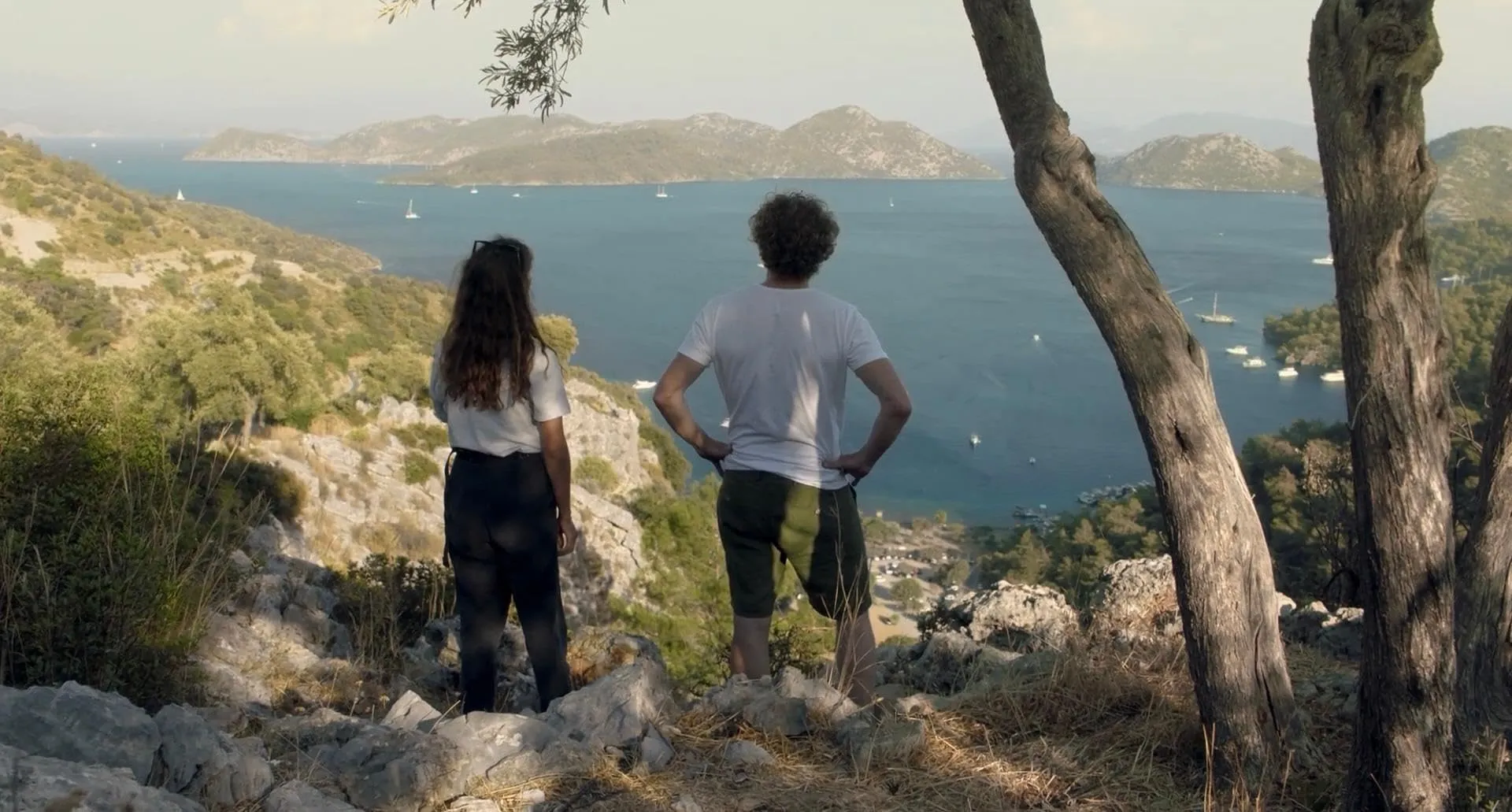Aslihan Ünaldi, a Turkish director, creates a moving narrative in Afloat set against the stunning backdrop of the Aegean Sea. The film’s serene beauty starkly contrasts its characters’ emotional turmoil.
The film follows Zeynep and Yasemin, two sisters, and their split parents as they set sail on what may be their last family trip together on a sailboat. This sad reunion is planned by Yusef, the father, a political dissident about to go to jail.
He adds an air of desperation and unresolved tension to every moment. His sentence is coming up soon, and it looks like a dark cloud over the beautiful water.
The family’s interactions reveal long-buried resentment and unspoken truths as they navigate the small boat environment. Zeynep’s return from New York with her American husband, Stephen, sparked sibling rivalry and familial strife.
Yasemin’s simmering resentment toward her father and sister sets off a series of clashes, and the idyllic setting becomes a furnace for their emotional struggles. As the characters deal with the weight of their shared past and the uncertain future that lies ahead, each meeting is complicated, echoing larger themes of identity and belonging.
Tides of Tension: The Complex Tapestry of Family in Afloat
The complicated relationship between sisters Zeynep and Yasemin, which is full of rivalry and longing and serves as a microcosm of larger familial conflict, is at the heart of Afloat. Yasemin, the younger sister, dislikes Zeynep’s success and security because she wants to be a documentary filmmaker. Zeynep represents a Western idea of success, while Yasemin struggles with the weight of expectation and the wounds of their broken family. This envy is not just sibling rivalry but reflects a profound cultural clash.
The sailing trip was supposed to be a peaceful get-together, but it quickly turns into a battlefield where old grudges come to the surface. There is a palpable tension in Yasemin’s conversations with Zeynep as she goes back and forth between cutting comments and moments of fragile vulnerability. Each meeting reveals new layers of fear and unspoken love, creating a painful and relatable picture of sisterhood.
The sisters’ relationship is already hard because their parents’ divorce throws a long shadow over it. Yusef, portrayed as having charisma and vulnerability, is a symbol of political dissent, embodying the complexities of a father torn between his familial responsibilities and ideological commitments. His upcoming prison sentence exacerbates the family’s problems, transforming the boat into a microcosm of their unspoken regrets and fears as a whole.
Another layer is added by the tension between Yusef and his ex-wife, Alev, highlighting how their daughters are affected by their unresolved problems. The sisters’ conflicts are set against Alev’s problems with her sense of identity following their breakup. The effects of divorce are felt not only in the emotional distance between people but also in their desperate efforts to get back together, revealing the complex web of love and resentment that keeps them together. The characters confront their pasts in this small space, forcing them to navigate the rough waters of familial love while the storm of loss is about to hit.
Anchored in Isolation: Thematic Depths of Afloat
The two themes of isolation and connection, carefully woven into the story’s limited setting, are expertly navigated by Afloat. As a symbol of emotional confinement, the sailboat is both a way to escape and a way to find freedom. The calm waters of the Aegean Sea contrast with the character’s inner struggles, revealing how being close can make isolation worse rather than better.
The tension of the boat and each family member’s unresolved confines prevent them from fully escaping. The cramped quarters act as a catalyst for confrontation, forcing suppressed resentment to the surface while fostering brief moments of intimacy. As the characters deal with their vulnerabilities, this paradox of closeness creates discomfort, exposing the fragility of familial bonds beneath the weight of unspoken fears.
The film deftly illustrates the tensions between Western ideals and Turkish customs while deeply examining cultural identity. Yasemin holds on to a more traditional, but becoming increasingly disappointed, point of view, while Zeynep, embodying a Western perspective, stands for success and freedom. In a socio-political environment that is changing quickly, this generational gap highlights the complexities of identity.
Yasemin doesn’t want to help Zeynep, which reflects the fight many people in modern Turkey face because the country is stuck between modernity and tradition. The conflict between the sisters illustrates the difficulties of balancing personal desires with familial expectations, highlighting how cultural narratives shape individual identities. The film encourages viewers to consider how these themes resonate beyond the confines of the boat, echoing the group experience of a society struggling with its evolving identity amid political and social upheaval.
Navigating Nuance: The Cinematic Craft of Afloat
Aslihan Ünaldi’s direction in Afloat is a delicate dance between subtlety and emotional resonance. This shows how well she can tell complicated narratives within the confines of a fairly simple setting. Her style is characterized by a camera that doesn’t get in the way and records private moments without imposing judgment, allowing the emotional truths of the characters to emerge naturally.
This restraint encourages the audience to fully immerse in the narrative, fostering a sense of involvement in the developing family drama. The pace is deliberate, which makes viewers want to enjoy the little details of each exchange, which often reveal more than the words. The film is elevated by this mix of understated storytelling and deep emotional depth, transforming it into a contemplative look at familial ties.
The performances in Afloat add to Ünaldi’s vision, especially the way the main characters are shown with a lot of depth. Nihan Aker expertly portrays the complexities of sisterhood as Zeynep and Elit Iscan as Yasemin, and their sincerity resonates throughout the film. Their chemistry encapsulates the emotional environment of their relationship by capturing the underlying tension between desire and resentment.
Also very interesting is Serhat Ünaldi, as Yusef’s performance is full of weight and weakness. His performance carries the weight of a father dealing with the consequences of his political views, and his casting adds a layer of authenticity that increases the film’s emotional impact. The film’s exploration of legacy and the ties that bind us, eventually painting a powerful picture of a family at a crossroads, is enhanced by the director and actor’s familial connection, which adds to the narrative.
The Aegean Canvas: Visual Poetry in Afloat
Afloat’s cinematography is like a beautiful symphony that goes well with the narrative. It shows how the Aegean Sea can be both a beautiful and dangerous backdrop. The film’s images, which Andre Jäger shot, have a luminous quality that makes you think of the coast’s calm beauty and the characters’ emotional turmoil.
Each frame is carefully put together, revealing the shimmering blues and greens of the sea, which are not just a background but an important part of the storytelling. Every wave carries the weight of the family’s unspoken fears and desires, and the cinematography adds to the narrative by helping the viewer become fully immersed in the family’s world.
This interplay of calm and rough waters is a powerful metaphor for the family relationships at play. The sea reflects the emotional currents of the characters as they navigate their own internal struggles, which can be calm or turbulent. The boat itself, which is both small and big, reflects how the characters are stuck in their familial roles and evoke feelings of isolation in the ocean’s vastness.
Moments of peaceful beauty are very different from the rising tension on board, just like the water’s surface can change from calm to rough in an instant, so do the family’s interactions. The fragility of their relationships is highlighted by this symbolism, which also shows how strongly external settings can affect internal ones. The Aegean, with its many faces, becomes a silent but powerful character in the narrative, embodying the intricate emotional web of Afloat.
Under Currents: Cultural and Political Resonance in Afloat
Afloat skillfully weaves human narratives with the larger political landscape to portray modern Turkey movingly. Not only is the father’s upcoming imprisonment a plot device, but it also represents the harsh environment that dissenters in Turkey must endure and highlights the consequences of speaking out against corrupt government officials.
The family is forced to confront their complicity and fears in a society where this central conflict gravely threatens the right to free speech, which gives the narrative urgency. As they navigate the emotional effects of his decisions, Yusef’s position as a political dissident intensifies the tension within the family, forcing each member to reflect on their values and relationships against this backdrop of social unrest.
The film also has a fresh feminist view, showing women as complex characters who have to deal with a patriarchal system. Zeynep and Yasemin are not just mirrors of their father’s problems; they are also people trying to figure out who they are and what their aspirations are in a world that often attempts to define them.
In Turkish cinema, where female characters frequently play supporting parts, the portrayal of these powerful, complex women challenges traditional narratives. Afloat emphasizes the value of their views and experiences by putting them in the lead roles, fostering a conversation about gender dynamics that resonates beyond the screen and prompting the audience to think about how women’s roles are changing in familial and societal settings.
Emotional Currents: The Resonance of Afloat
The emotional journey in Afloat draws the audience into the family’s intricate web of unresolved problems, which is expertly crafted and truly resonates with the audience. The inner struggles of each character are exposed, exposing their fears, regrets, and aspirations in their purest form.
The interactions between Zeynep and Yasemin, where the weight of their familial past casts a long shadow over their present, are particularly characterized by this emotional depth. As the film progresses, the unresolved tensions drive the narrative and compel viewers to confront their familial dynamics and the secrets they have kept hidden.
The pacing of the film is very well thought out, allowing the emotional stakes to rise gradually. The audience is drawn into the world of the characters by Ünaldi’s slow-burning narrative, which creates an exciting and emotional sense of anticipation. Every moment has a layer, and the slow pace adds to the drama by ensuring that every confrontation and reveal has weight.
Building tension through this structure matches the characters’ emotional turmoil, making the final climaxes feel natural rather than forced. The result is a movie experience that stays with you long after the credits roll, echoing the complexities of family love and the pain of being apart against the stunning backdrop of the Aegean.
The Review
Afloat
Aslihan Ünaldi expertly directs Afloat, a beautiful film about familial ties, cultural identity, and personal battle. A resonant narrative that challenges traditional dynamics in Turkish cinema is produced by the film's emotional depth, compelling performances, and stunning cinematography. It makes viewers think about their links and the complexities they are involved in through its slow-burning pacing and rich symbolism. Afloat is a must-see for anyone looking for more depth in storytelling because it serves as a moving example of the interplay between personal and political issues.
PROS
- Richly developed characters and complex family dynamics.
- Beautiful visuals that enhance the narrative and setting.
- Authentic portrayals by the lead actors, particularly the sisters.
- Thoughtful exploration of contemporary Turkish issues.
- Effective use of the Aegean Sea as a metaphor for emotional turmoil.
CONS
- Some viewers may find the slow-burn approach too languid.
- The intertwining of personal and political might be challenging for some audiences.
- The focus on dialogue and internal conflict may not appeal to those seeking a more dynamic plot.





















































